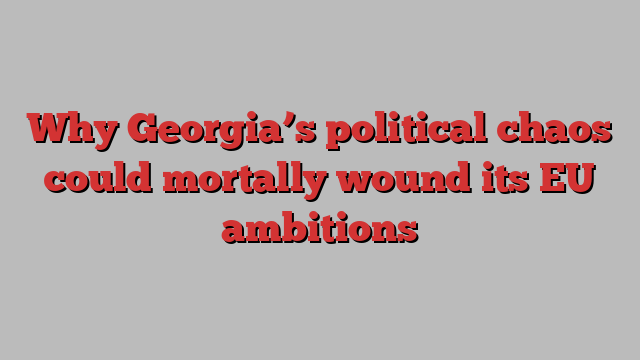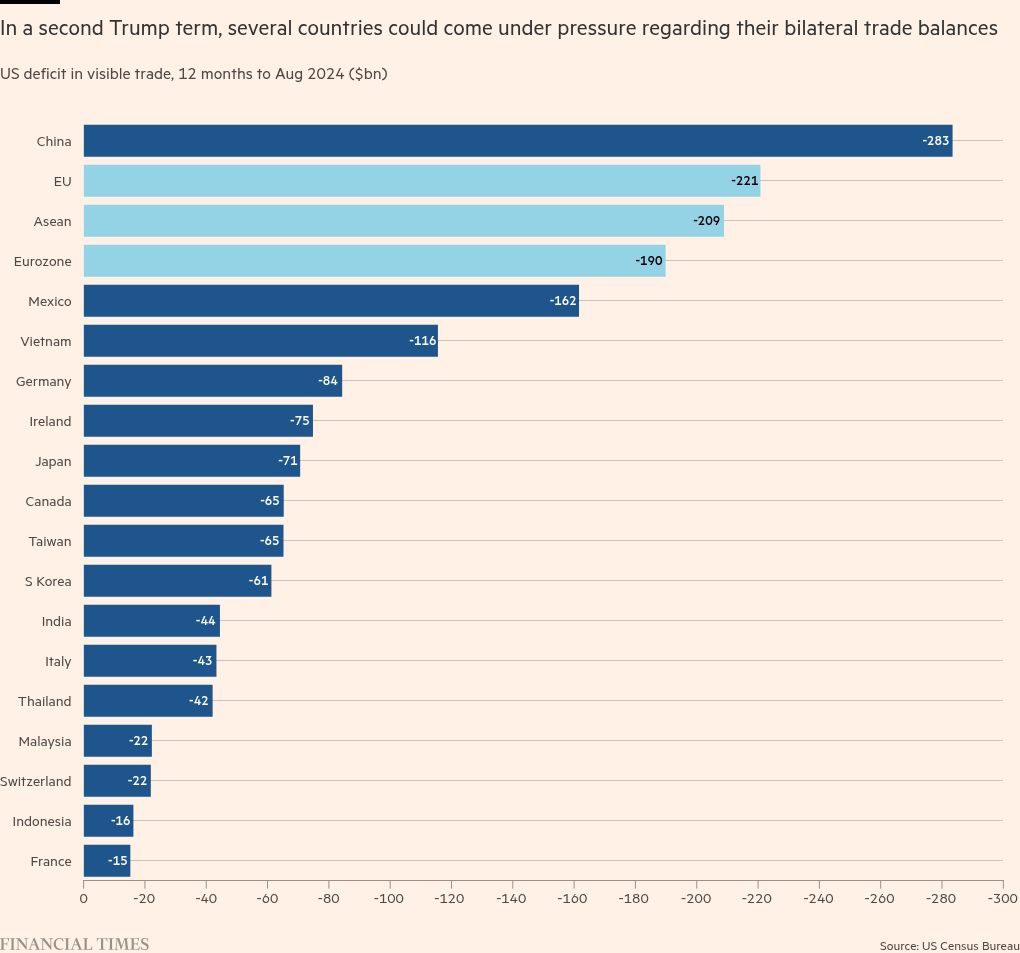
This article is an on-site version of our Europe Express newsletter. Premium subscribers can sign up here to get the newsletter delivered every weekday and Saturday morning. Standard subscribers can upgrade to Premium here, or explore all FT newsletters
Good morning. You’re receiving Europe Express from me this week while Henry is on holiday.
Yesterday’s elections in Bulgaria have failed to unblock a political impasse, as the centre-right Gerb remained the strongest party but fell short of a majority again, according to exit polls.
Today, Henry has a departing missive on the Georgian election results, which may be the final nail in the coffin for Tbilisi’s EU accession. And our energy correspondent has a damning report on the lifestyle of the rich and famous.
Georgian nightmare
Hungarian Prime Minister Viktor Orbán will fly to Georgia later today to endorse the country’s ruling pro-Russian party as it claims victory in Saturday’s election — a vote that has thrown the EU’s policy towards the country into deep disarray, writes Henry Foy.
Context: Georgia is an EU candidate country. Preliminary results from the parliamentary election suggest the ruling Georgian Dream won 54.2 per cent of the vote. A coalition of pro-EU opposition parties have rejected that, claiming the election was “stolen”, and called for widespread protests.
The country’s President Salome Zourabichvili yesterday disavowed the election results saying they were the work of a “Russian special operation” aimed at killing the country’s future.
GD, which is led by Georgia’s richest man, pro-Russian oligarch Bidzina Ivanishvili, has run the country for 12 years. Its anti-EU rhetoric, outreach to Moscow and authoritarian tendencies have seen Brussels freeze the country’s EU membership progress.
Orbán, the EU’s most pro-Russian leader, congratulated GD on an “overwhelming victory” before polls had even closed on Saturday evening.
His visit to Tbilisi, including public events with GD officials tomorrow, will both further inflame the tense post-election atmosphere in the capital, where the opposition party headquarters has been attacked, and complicate the EU’s response to the turmoil.
Orbán holds the EU’s rotating presidency, giving him a representative role until the end of the year. Previous visits to Moscow and Beijing in this capacity have led to widespread condemnation from his fellow leaders.
The Hungarian leader’s stunt was announced yesterday evening during a 20-hour long silence from the EU itself following the initial election results, as Brussels scrambled to work out what to say.
Early evening yesterday, the European Commission issued a statement calling on the Georgian authorities to “swiftly, transparently and independently investigate and adjudicate electoral irregularities and allegations thereof”.
“We reiterate the EU’s call to the Georgian leadership to demonstrate its firm commitment to the country’s EU path,” said EU Council president Charles Michel in a separate statement, adding that the situation would be discussed by the EU leaders next month.
Endorsing GD’s victory, even implicitly, would deliver a crippling blow to the country’s pro-EU movement. But refusing to recognise it would inflame Ivanishvili’s rhetoric that Brussels — as part of a “global war party” — is working to bring down his government.
Either would cripple its accession efforts, and tilt Georgia firmly towards Moscow.
Chart du jour: Unpredictable

Donald Trump is keeping America’s traditional allies largely in the dark over his plans if he is re-elected as US president. But on some issues he is clear, according to his aides — such as pushing other countries to spend more on defence and to equalise their trading relationship with the US.
Cop out
With one week to go before the global climate conference COP29, Oxfam has warned that billionaires’ expensive lifestyles with private jets and super yachts are a key driver of climate change, writes Alice Hancock.
Context: Next week, delegates arrive in Baku, Azerbaijan, for the annual UN COP climate conference. But many diplomats are sceptical about progress, as talks on mitigating emissions and climate finance have been stuck.
In a report published today, Oxfam finds that if every person on the planet emitted as much carbon as the richest 1 per cent, the world’s remaining carbon budget — the amount of emissions that can be produced while limiting temperature rises to 1.5C compared with pre-industrial times — would be burnt through in fewer than five months.
Oxfam argues that the onus of cutting emissions should therefore fall on to those who can afford it the most. “Keeping the world below a 1.5C rise requires the emissions of the richest 1 per cent to drop by 97 per cent by 2030,” the report says.
Using available data, the Oxfam report found that the 31 richest people in the EU emit 3,469 tonnes of carbon dioxide per capita — 432 times more than the average European — mostly due to their high-end transport choices.
Yet little has been done to increase taxes on shipping and aviation fuels. EU diplomats negotiating new rules on energy taxes are currently pushing to keep shipping and aviation fuel tax exempt until 2035, according to a draft proposal.
What to watch today
-
European Commission president Ursula von der Leyen gives a speech at the College of Europe in Bruges, Belgium.
-
French President Emmanuel Macron visits Morocco.
Now read these
Recommended newsletters for you
Trade Secrets — A must-read on the changing face of international trade and globalisation. Sign up here
Swamp Notes — Expert insight on the intersection of money and power in US politics. Sign up here
Are you enjoying Europe Express? Sign up here to have it delivered straight to your inbox every workday at 7am CET and on Saturdays at noon CET. Do tell us what you think, we love to hear from you: [email protected]. Keep up with the latest European stories @FT Europe